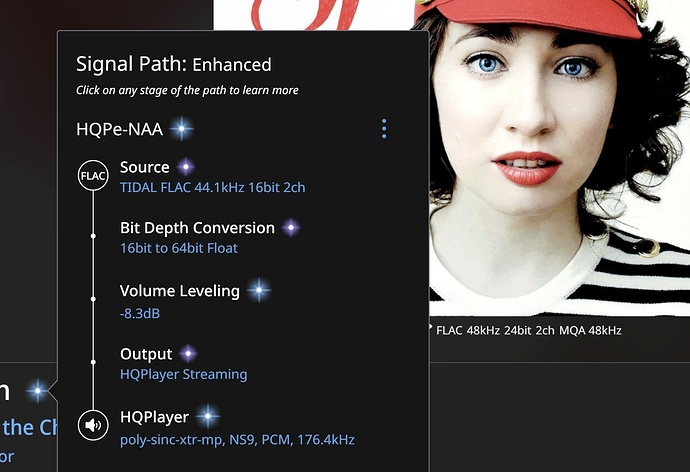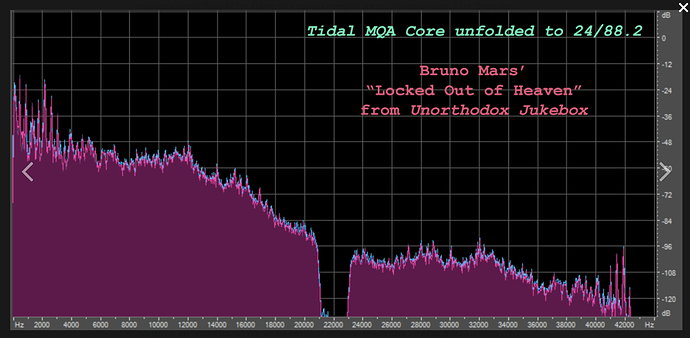don’t forget to unsubscribe if you’re not going to keep using it! It’s a monthly fee.
Let us know how you get on, hope it is a success, but as you say, it’s easy to try and not a lot to lose cost wise.
Good luck!
Uugghh… this is disappointing. I never bought into the mysterious black curtain of MQA and usually select red book. I have no option here as Qobuz has decided not to enter the market in Canada. Tidal should not remove standard red book.
Streaming and recommendation from Valence are fantastic in discovering new music. Too bad that I’m forced to use something I never wanted or asked for. I’m ever more grateful that I still curate a local library.
Is that stated policy to phase out 44/16 at the expense of MQA , I hadn’t seen anything stated
I don’t know about any stated policy.
But like the OP mentioned, I can see some recordings under VERSIONS that used to return a treasure trove for audiophiles. All versions including MQA, Red Book, even different masters; now only have an MQA file in it’s place.
I just want to add, I have nothing against MQA. Just wish they left the choice open for Red Book versions. Thanks.
I haven’t seen anything official from Tidal. But browsing the library it looks like it’s going hand-in-hand with the “millions of new MQA titles” being added.
I’ve been listening to tracks picked by Roon Radio for a few hours and have noted this more than a few times…signal path shows FLAC non-mqa but the album stats show MQA and versions tab only show MQA’d versions available.
I have my Tidal settings to Hifi and MQA core decoder set to No intentionally. Perhaps the plain flac version is still there just hidden.
I can replicate that behaviour too with streaming set to HiFi.
I would confirm with @danny and others though, because those MQA files are still in FLAC wrappers. Effectively you can put anything into a FLAC wrapper - a low bit rate mp3 - for example. The source file will still have undergone its MQA conversion, it’s just you’re playing what is basically a 15-bit lossy conversion in a FLAC wrapper.
So I don’t think you’re getting a Redbook stream by doing this, but would be happy to be corrected.
That thought crossed my mind but I think it will still show the MQA in the signal path when playing the truncated compatible 15-bit version. It’s a shame they’ve messed with this at all. MQA is ‘solution’ looking for a non-existent problem. It’s not 1994 any longer.
I listen mainly to classical music, and there the problem seems not to be so much the preference of MQA streams over Red Book, but that there are still so many albums available only as AAC at 22.05. And it isn’t just old releases, but also albums from just a couple of years ago. There are album series (vol. 1, vol. 2, etc) where one or two volumes are available as Flac at 16/44.1, the rest only as AAC. In those cases I would certainly prefer to be able to stream as MQA instead of AAC, even if I don’t care for MQA nor use a DAC able to do proper MQA rendering.
The current mix of different formats and quality levels on Tidal is a big mess.
My thoughts exactly. It’s a pain to see once simple 16bit 44.1kHz files being replaced with 16bit 44.1kHz MQA. Who really wants this? Who really benefits from this? Take something simple and make it complicated.
I’m surprised that there aren’t more subscribers upset about this.
I haven’t heard a MQA file that sounds worse than the 16/44 version.
I’ve heard a number of them. The problems are in the upper frequencies. It sounds like an extra layer of processing that is not there in the CD version. A glare that wears on my listening stamina.
It’s not night and day but I’ve yet to find a MQA version I prefer over the same CD version. Sure a better mastering is a better mastering and that wins…
“It sounds like an extra layer of processing that is not there in the CD version.”… I wonder why…
I know it’s subjective but even in 16 Bit 44.1KHz material Qobuz sounds like CD and Tidal like…something reprocessed, more sibilant. Qobuz sounds more natural and full bodied.
I’m now on the 30d free trial of Qobuz and will most likely switch, after using Tidal for 2 years.
I couldn’t care less for MQA, much less so if they will replace all redbook content with MQA, which I don’t even have a DAC for.
I have noticed this more with new MQA material. I have managed to spot an MQA track every time ones come up on my main system that’s not MQA capable because of this glare. It’s only evident in a non full MQA chain though. Use an MQA DAC and it’s gone. But thats not the point considering they claim its better than CD without the full chain. When I switch to the Qobuz version it sounds less harsh. It seems to be like this on new materials more than older stuff so likely down to mastering as well but Qobuz often sounds way better.
I have just ditched Tidal to. There are some things missing but I am going to see how I get on, I can’t justify having the two and I am less of a fan of mqa so it makes sense.
3 posts were merged into an existing topic: What MQA are we listening to [2020]
[Solved below, don’t bother replying…]
I don’t know how all this works, but I would assume that the Roon Core would decode the MQA the same as any other MQA capable hardware. What’s the difference?
Roon can only do the First unfold, you need an MQA DAC for the final rendering.
[Solved below, don’t bother replying…]
So if my chain is a Windows PC w/ Roon Server > Ethernet > Rasp Pi 4 w/ Ropieee > USB > MiniDSP2x4HD > Amp — what’s happening when I listen to a Tidal MQA? Am I not getting the full resolution? I thought all the MQA stuff was happening within Roon, and my endpoint was getting sent a full resolution 24/96 or whatever.

